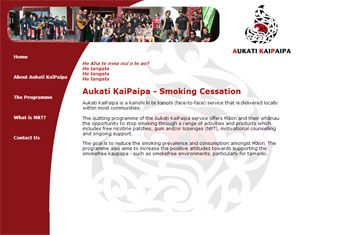Aukati KaiPaipa
Aukati
KaiPaipa is a free nationwide programme that aims to reduce smoking prevalence amongst Māori and increase the number
of positive changes in smoking behaviour, such as maintaining smokefree environments, particularly for tamariki (children).
It is a kanohi ki te kanohi (face to face) service delivered to whānau as an intensive programme for between 8 – 12
weeks by providers around the country.

Aukati KaiPaipa is especially effective for Māori, producing 12 month abstinence rates close to 30%.3 This
is significantly better than the 3% chance of quitting long-term seen with unaided “cold turkey” quit attempts.
The programme offers whānau the opportunity to address smoking addiction through a range of services including
NRT, motivational counselling and ongoing support. It includes:
- Assessment – Quit Coaches identify the client’s readiness to quit and develop a personalised programme.
- Reduction plan (two to four weeks) – to help identify coping skills to overcome smoking triggers and encourage
cigarette reduction towards becoming smokefree.
- Intensive programme (eight weeks) – In this stage clients actively become smokefree. Nicotine Replacement Therapy
(NRT) patches and gum are provided to make the smokefree transition easier, and with the support of a Quit Coach, at
the eighth week clients should be able to maintain their smokefree lifestyles.
- Three, six, nine and 12 month follow-ups provide support, assisting with relapses and encouraging clients to keep
up the good work.
Kanohi ki te kanohi counselling sessions help to support clients through the lifestyle changes required for a successful
smokefree transition. Breaking the psychological behaviour that is associated with smoking is ongoing and Aukati KaiPaipa
aims to provide the skills necessary to achieve this.

A list of providers is available on the Aukati KaiPaipa website:
www.aukatikaipaipa.co.nz/contact-us
Aukati KaiPaipa provider profiles
Aukati KaiPaipa
Kokiri Marae Health and Social Services
Lower Hutt
www.kokiri-hauora.org.nz/services/aukati_kai_paipa.html
Quitting smoking has a domino effect in changing lifestyles. For whānau, Aukati KaiPaipa is more than a smoking
cessation programme, it is a catalyst for many other life style changes.
Sharon Reid is a passionate and determined advocate for Aukati KaiPaipa. She has witnessed first hand the difference
quitting can make to whānau. Some of the most inspiring and encouraging changes can be attributed to the people themselves;
through support by highly trained staff and through sheer effort and will, many smokers have been able to make significant
changes to their lifestyle.
“We have seen long term smokers entering the Aukati KaiPaipa programme, after smoking for 30 – 40 years
and quitting. Many have succeeded in staying smokefree, some have relapsed but the key for us is having a no fail system.
They can come back and access our services as many times as needed.” – Sharon Reid
Aukati KaiPaipa recognises that quitting is a long term process, and the Aukati KaiPaipa programme adapts to meet the
needs of those smokers for whom quitting presents an extraordinary challenge.
Face to face meetings conducted in the homes of clients or workplaces have encouraged many people to access the service.
Clients are visited every week for up to 12 weeks, support is provided with nicotine replacement therapy and after the
initial 12 weeks, contact is maintained on a monthly basis for nine months.
Sharon attributes the success of the Aukati KaiPaipa programme to a holistic approach in conjunction with other health
and social services. Referral between services is common, e.g. Tu Kotahi Māori Asthma Service. Aukati KaiPaipa also
delivers specific smoking cessation services to young people and people with mental illness.
“What keeps staff motivated are the changes they see in people quitting; their confidence increases, they feel
good about themselves and even though some may not succeed immediately, they make changes that remain over time. Quitting
smoking will result in the biggest health gains for Māori and this outcome is the main driver for our Aukati KaiPaipa
Programme.” – Sharon Reid
Te Haa Ora
Te Oranganui Iwi Health Authority
Whanganui
www.teoranganui.co.nz
“It’s about having a passion for the mahi (work). We are there to support clients who want to quit, without
having to judge. Kanohi ki te kanohi (face to face), is best for our people.” – Mel Maniapoto
Mel Maniapoto is one of a team of three dedicated smoking cessation practitioners based within Te Oranganui Iwi Health
Authority PHO. They run a number of very successful smoking cessation clinics in rural and urban settings and use the
Aukati KaiPaipa approach to deliver a “for Māori, by Māori” cessation programme.
Te Hotu Manawa Māori

Te Hotu Manawa Māori was one of three organisations which established Quitline and set up a Māori Tobacco
Control advocacy organisation. It is also responsible for training the national Māori cessation service, Aukati
KaiPaipa. Te Hotu Manawa Māori can provide support and training for any medium to large scale innovation in cessation
developments or programmes for Māori.
www.tehotumanawa.org.nz
Recently at the request of a local employer, they delivered an eight week, workplace smoking cessation programme. The
team worked with 32 clients on a weekly basis, motivating lifestyle changes, encouraging peer support and providing NRT.
The workers were allowed 30 minutes of paid time each week to attend the cessation programme on site. Their whānau
were also encouraged to attend. Although some attrition did occur (eight had left the programme at the end of eight weeks),
37% managed to quit on completion of the eight week programme. Follow up visits will be continued every three months.
Overall, this Aukati KaiPaipa team has achieved a quit rate of approximately 38%.
“Aukati KaiPaipa works because it is ideally suited to Māori.Our clients can choose to attend a rural clinic,
come to our offices in town or have a practitioner visit them at home. This is one of the most popular ways that we work
with clients – one on one or working with the whole whānau in the comfort of their home, is a powerful way
to help people quit smoking.” – Mel Maniapoto